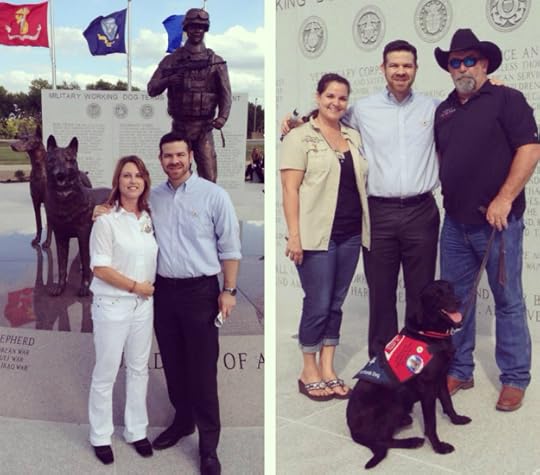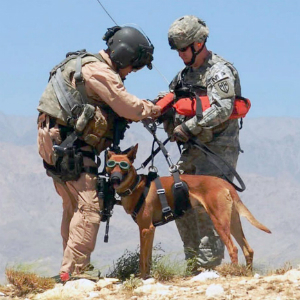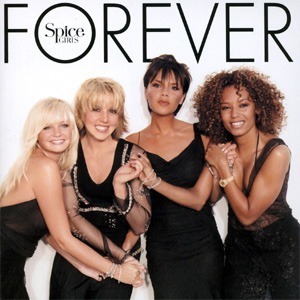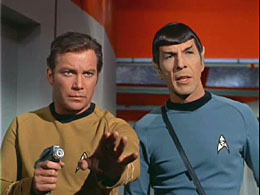Thomas E. Ricks's Blog, page 80
November 1, 2013
We Interrupt Your Regularly Scheduled Blog Posts … War Dogs Descend on Best Defense

By
Rebecca Frankel
Best
Defense Chief Canine Correspondent
There's been some exceptionally
noteworthy and, in at least one case, monumental, war-dog news this week. And
being the ever-generous canine enthusiast that he is, Tom is letting Best
Defense go to the dogs -- at least
for today.
In this special line-up
we have a dispatch from the dedication ceremony of the first-ever official
national memorial to military working dog teams and a post about the Special
Forces dogs going after Joseph Kony.
But first, here's a
quick rundown of the headlines at home and abroad:
For
the first time,
the Royal Australian Air Force is going to allow its military dogs to be
adopted by their handlers and "spend the rest of their years out in the home
environment rather than the service environment." Head of the MWD Unit at
RAAF, Sgt. Russ Durre, called it
"a big step from what we've done in the past." While civilians often adopt
retiring MWDs, usually when a U.S. service dog retires there's a nice long line
of handlers ready and waiting to take their former partners home for keeps.
Kudos to Aussie forces, but I'm guessing that the consensus is that this is a
step long overdue.
In October we
said farewell to U.S. MWD Athos who was laid to rest on Oct. 30
at his home station at Joint Base Charleston, and to MWDs
Fama and Beny who had both deployed to Iraq during their war-dog
careers.
In happier news,
former Marine Corps IDD handler Sergeant Jonathan Cooper,
who had been searching for news of his canine partner -- a yellow lab named Ggunner
-- finally got word this week of the dog's whereabouts. The two had deployed to
Afghanistan together in 2011, but Cooper had lost track of the dog and put out
word of his search on Facebook in the hopes of finding and eventually adopting
Ggunner. Here's hoping they'll be reunited.
Hat tip: The
nameless and still-dedicated former handlers who run the Military Working Dogs FB page.
Rebecca
Frankel is special projects editor at Foreign
Policy.
War Dog Guest: A Dispatch from the First-Ever National MWD Monument

Former Marine dog
handler Mike Dowling was one of the very first MWD handlers to be sent into
Iraq in 2004. We've long been following tales of Mike's deployment with his
dog Rex here on WDotW. On Oct. 28, Mike
attended -- along with hundreds of others -- the Military Working Dog Teams
National Monument dedication ceremony at Lackland Air Force Base.
Military Working
Dog Teams: A Legacy of Saving & Protecting Lives
By Mike Dowling
Serving
as a Marine Corps dog handler with my military working dog, Rex E168 (Rex's
serial number), was the greatest experience I had in my life.
But before
becoming a dog handler I, regrettably, had very little knowledge of the history
and proud legacy built by the blood, sweat, and tears of the war dog teams that
served in previous conflicts, including WWII, Korea, and the Vietnam War. Do a
little research and you will quickly find the legacy of war dog teams is that
of triumph and tragedy, but overall incredible success -- success at saving
lives, thanks to the bravery and heroics of those dedicated dog teams. I feel
all dog teams that have served in Iraq and Afghanistan -- as well as those dog
teams continuing to serve today -- have proudly carried on that legacy of
success with new chapters of triumph and tragedy.
That
proud legacy is now immortalized thanks to the Military Working Dog Teams
National Monument that was dedicated on Oct. 28. The monument is the
culmination of over eight years of advocacy by Vietnam dog handler John Burnam
and his dedicated team of former dog handlers. The occasion was long overdue,
and yet it's another example of how passionate and dedicated handlers are in
getting these "unsung heroes" the recognition, honor, and respect they deserve.
Now that the monument has been dedicated they are officially no longer unsung
heroes -- they are just heroes. [[BREAK]]

I was
beyond humbled to have been asked to speak during the dedication ceremony. I
couldn't help but feel emotional as I spoke about Rex and my friend Sgt. Adam
Cann, a dog handler killed in action. The emotions did not end there, however,
as I was honored to meet the parents of Cpl.
Dustin Lee and Colton
Rusk, both dog handlers who had been killed in action. I also was
reacquainted with the veterinarian who saved Rex's life when he performed an
emergency gastropexy on him. Thankfully, our beloved veterinarians and vet
techs are honored on the monument as well.
The
most moving part of the ceremony for me was when Vietnam dog handler Jim Frost
spoke with conviction to all Vietnam handlers, proclaiming "all your dogs are
home now!" The war dogs that served in Vietnam are the only ones who never came
home and, deservedly, there is a special "Not Forgotten Fountain" just for
them.
The
monument represents a proud tradition and legacy of saving lives. It is a symbol
of honor and ultimate respect for war dog teams that have served in the past,
those currently serving, and those dog teams who have yet to build a bond. It
is especially symbolic for those handlers and dogs that have paid the ultimate
sacrifice, for they will truly never be forgotten.
SEMPER K9
Mike
Dowling is the author of Sergeant Rex: The Unbreakable
Bond Between A Marine and His Military Working Dog.
Above Mike poses
with Rachel Lisenbee (mother of Dustin Lee) and the parents of Colton Rusk and his dog Eli.
Rebecca's War Dog of the Week: They're Sending War Dogs to Track down Kony

By
Rebecca Frankel
Best
Defense Chief Canine Correspondent
Earlier this week, FP's own Elias Groll wrote an in-depth profile about intrepid
reporter Robert Young Pelton and his plan to track down the notorious African
warlord Joseph Kony. Apparently, though, it's not just Pelton who's going
all-in on going after Kony. In his Washington
Post article, "Kony 2013: U.S. quietly intensifies effort to help African
troops capture infamous warlord," Rajiv Chandrasekaran reports that U.S. forces are sending in
tracker dogs:
African
troops and their U.S. advisers are also being aided by two American
philanthropists, who are paying $120,000 a month for six Belgian Malinois
tracking dogs and their handlers. The dogs have accompanied soldiers on patrols
and raids. In September, they were helicoptered into the rebel camp near
Garamba to assist in the search for fleeing Kony loyalists.
The
dog teams are funded by Howard G. Buffett, the eldest son of billionaire
investor Warren Buffett,
and Shannon Sedgwick Davis, an activist from Texas who heads the Bridgeway
Foundation, the charitable arm of Bridgeway Capital Management, a large
investment firm that devotes half of its after-tax profit to human rights
causes.
The United States
used tracker dogs with tremendous success during the Vietnam War. Navigating
the tangled brush of the jungle was no easy task; not only did the dogs help
keep their handlers and the men who followed behind them on a safe path, but
patrols that were accompanied by dog teams were almost always able to avoid
being ambushed. And though it's a less-utilized skill deployed by the
military's dog program nowadays, tracker dog teams still offer the same
advantages, especially in a manhunt scenario. I've followed behind a tracker
dog team and watched SF dog teams train. Their skills are unparalleled.
So, the question in
this instance really is not "Why would Special Forces employ dog teams on the
Kony manhunt mission?" but, "Why wouldn't
they?"
In a brief exchange
over Facebook, I asked Pelton what he thought about sending these elite dogs in
on the hunt for Kony.
"Obviously
I have seen these dogs in action," he wrote. "But I have also seen that part of
Africa ... These well trained dogs are typically used in close encounters
(flushing a suspect out of a hiding place, rather than across hundreds of miles
of swamps, grasslands and forests.) They are good, but nothing replaces HUMINT
and man trackers." He added: "The Special Forces are the best of the best...
but they are also restricted by a number of rules, resources and just the vast
scope of the region. I wish them luck!"
And
so do we.
Rebecca
Frankel is special projects editor at Foreign
Policy.
October 31, 2013
Getting rid of all bad guys: The American mission, or a recipe for forever war?

Rajiv Chandrasekaran had a very
good look at U.S. special operators pursuing warlord Joseph Kony. Well worth
your reading.
But in it, my hackles were raised
by this comment from an American diplomat:
"Is Joseph Kony a direct threat to the United
States? No," said Scott DeLisi, the U.S. ambassador to Uganda. "He's not
targeting U.S. citizens. He's not targeting U.S. embassies. He's not al-Qaeda."
Instead, DeLisi said, Kony merits U.S.
involvement because his malign behavior runs counter to "our core values."
"Why is the United States engaged in the world,
for God's sake?" he said. "If we are true to what we believe in as
Americans ... we need to get rid of Joseph Kony."
Justifications like that make me
sympathetic to the Bacevichians who want us to pull back. If the U.S. mission in the
world is to get rid the world of evil, we are going to be fighting for a
loooong time. Among other things, that likely will undermine our nation. So by
trying to enforce American values abroad we may lose them at home.
Comment of the day: Screenplays being shopped before OBL cools to room temp

So
avers the reliable Jim Gourley, and I agree with his harsh assessment of the celebrification of Special Ops: "Everything is out of the closet. People
hardly knew anything about the OSS during WWII. These days the script to Zero Dark Thirty is finished before Osama's body is
cold."
Time to move the
SEALs out of California to someplace like Biloxi?
Capt. James Kirk beams down

I kid you not. The
first commander of the Starship Zumwalt is Capt. James Kirk.
The Navy is now on
the urgent lookout for an XO with unusually pointy ears.
(HT to YKW)
October 30, 2013
Special Operator: Tom's wrong to worry about SOF as the heart of military culture -- but the Vietnam parallels are killing me

Here's an informed response to my mulling the other day
about the central place that SOF has taken in U.S. military culture over the
last decade:
I think you and a lot of others are off, the SOF community
has been actually made to become more interwoven with conventional than I
think a lot of people understand and it has actually hampered us in many ways
from our traditional missions. We are going on Conventional Missions, because
we are better trained than conventional forces I think it makes some think we
can do anything. All of our ROEs are very restrictive, for instance we are
not even allowed to do ambushes technically, can't make that shit up. It is
that old adage from Murphy about the better you do the more you are used and of
course the other historical "SOF Truth", you will be misused in
conventional operations.
Combine that with the lack of strategy at the GO level and
the real problems are mostly in our leadership, not the small amount of trigger
pullers. VSO was the only strategy that had any chance, but they waited
too long on it and much like the CAP in Vietnam they are ending it early. It is
a decades-long effort followed by decades more of facilitation and support for
the units you train.
As much as I hate to admit this, the parallels between the
Vietnam conflict and this war are killing me:
Leadership micromanagement from the TOC vs. the same in
Vietnam, just better tech now. UAVs vs. Helos and Blue Force Trackers vs. Radio
Check in or in addition to Check ins, etc...
Lack of sharing of burden by that same leadership.
Lack of a consistent long-term strategy.
Lack of holding officers accountable at the senior level.
Rotations in and out of theater instead of consistent
presence.
Restrictive ROEs (not just CAS).
Misuse of SOF.
Media driven.
Lack of will by any administration to be honest with the
public on how long and why how long a commitment would be.
And of course, blatant fibbing by the brass to the guys on
the ground, apparently VSO and our efforts have already worked,
despite it being a 10-year program, must have missed the memo on that. I think
the Afghans missed it too.
Who is killing the journalists of Basra?

Four journalists
have been killed in recent weeks in Basra, which appears to be the most dangerous city in the
world for reporters.
Another ugly
fact: Over the last 10 years, sixteen
employees of the Al-Sharqiya channel have
been killed.
Meanwhile, lots of
bombs also killing people in Baghdad. And nasty little Tarmiyah, too. David Petraeus meditates on that in a piece here. Best line:
"As important as the surge of forces was,
however, the most important surge was what I termed ‘the surge of ideas' -- the
changes in our overall strategy and operational plans." Overall, it is the most
complete assessment I've seen by Petraeus of the surge. His conclusion on Iraq today:
"time is
running short." Calling Tom Friedman!
Farewell to Abu Muqawama

Andrew Exum closes
up shop on his blog with some fine final reflections. Check out especially his concluding rules
for living and working in Washington.
Ink
Spots also seems to be
gone. The military blog field seems to be shrinking, with few new additions,
among which even Duffel
Blog seems to be slowing
down a bit. Say it ain't so, Joes.
Finally, an aside to
Doctrine Man: Your list reminds me of deck chairs on the Titanic. It would be
like rejecting the formation of NATO because the U.S. Army already had plans to
open a PX in Heidelberg.
October 29, 2013
Army to its captains: Thanks for your service. Now, 20 percent of you, get lost!

That's how I read this message recently
sent out by an Army lieutenant colonel to field grade officers in his command:
You may already know, but there
are going to be Officer Separation Boards (OSB) and Enhanced Selective Early
Retirement Boards (E-SERBs) for Army Competitive Category Captains in Year
Groups 2006-2008 and Majors in Year Groups 1999-2003 beginning in March 2014.
Initial word is that the OSBs and
E-SERBs will select less than 10% of the considered majors and captains in year
group 2008 and less than 20% of the captains considered in year groups 2006 and
2007.
I am meeting with the officers in
the battalion affected that are physically at Ft. [DELETED] to discuss their
Professional Development and future officer actions and will provide them an
assessment of their potential for future service and potential risk of being
selected for involuntary separation, and will help prepare their files for the
boards. Additionally they are contacting their HRC Branch Representatives for
an assessment. I recommend you find a trusted senior officer to do the same.
Thomas E. Ricks's Blog
- Thomas E. Ricks's profile
- 437 followers



